The AnandTech Coffee Lake Review: Initial Numbers on the Core i7-8700K and Core i5-8400
by Ian Cutress on October 5, 2017 9:00 AM EST- Posted in
- CPUs
- Intel
- Core i5
- Core i7
- Core i3
- 14nm
- Coffee Lake
- 14++
- Hex-Core
- Hyperthreading
Benchmarking Performance: CPU Rendering Tests
Rendering tests are a long-time favorite of reviewers and benchmarkers, as the code used by rendering packages is usually highly optimized to squeeze every little bit of performance out. Sometimes rendering programs end up being heavily memory dependent as well - when you have that many threads flying about with a ton of data, having low latency memory can be key to everything. Here we take a few of the usual rendering packages under Windows 10, as well as a few new interesting benchmarks.
All of our benchmark results can also be found in our benchmark engine, Bench.
Corona 1.3: link
Corona is a standalone package designed to assist software like 3ds Max and Maya with photorealism via ray tracing. It's simple - shoot rays, get pixels. OK, it's more complicated than that, but the benchmark renders a fixed scene six times and offers results in terms of time and rays per second. The official benchmark tables list user submitted results in terms of time, however I feel rays per second is a better metric (in general, scores where higher is better seem to be easier to explain anyway). Corona likes to pile on the threads, so the results end up being very staggered based on thread count.
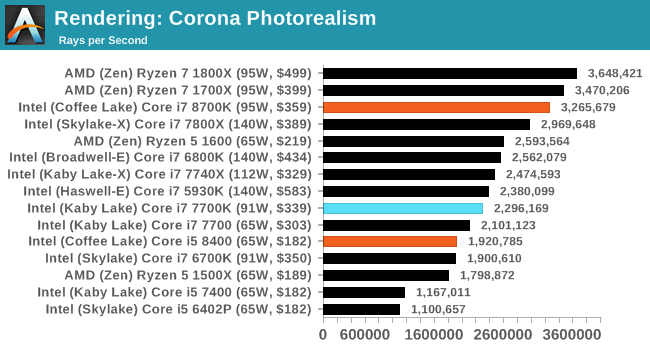
With more threads on display, the Core i7-8700K gets ahead of the previous mainstream Core i7 parts. The frequency difference over the Skylake-X processor gives an extra +10% performance, but the 16-thread parts from AMD win out overall.
Blender 2.78: link
For a render that has been around for what seems like ages, Blender is still a highly popular tool. We managed to wrap up a standard workload into the February 5 nightly build of Blender and measure the time it takes to render the first frame of the scene. Being one of the bigger open source tools out there, it means both AMD and Intel work actively to help improve the codebase, for better or for worse on their own/each other's microarchitecture.
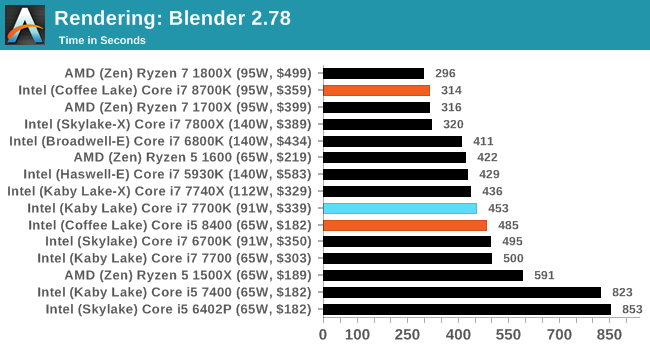
Blender seems to separate very nicely into core counts, with six cores from Intel matching eight cores from AMD.
LuxMark v3.1: Link
As a synthetic, LuxMark might come across as somewhat arbitrary as a renderer, given that it's mainly used to test GPUs, but it does offer both an OpenCL and a standard C++ mode. In this instance, aside from seeing the comparison in each coding mode for cores and IPC, we also get to see the difference in performance moving from a C++ based code-stack to an OpenCL one with a CPU as the main host.
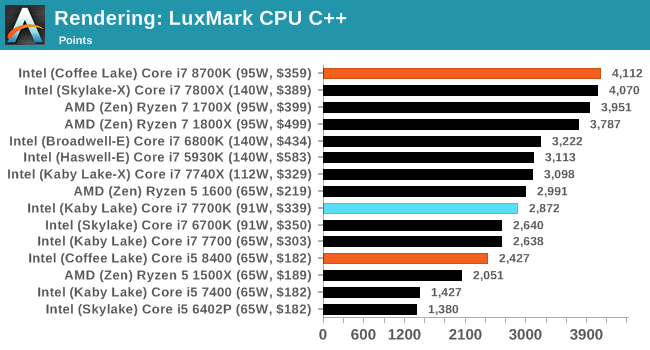
POV-Ray 3.7.1b4: link
Another regular benchmark in most suites, POV-Ray is another ray-tracer but has been around for many years. It just so happens that during the run up to AMD's Ryzen launch, the code base started to get active again with developers making changes to the code and pushing out updates. Our version and benchmarking started just before that was happening, but given time we will see where the POV-Ray code ends up and adjust in due course.
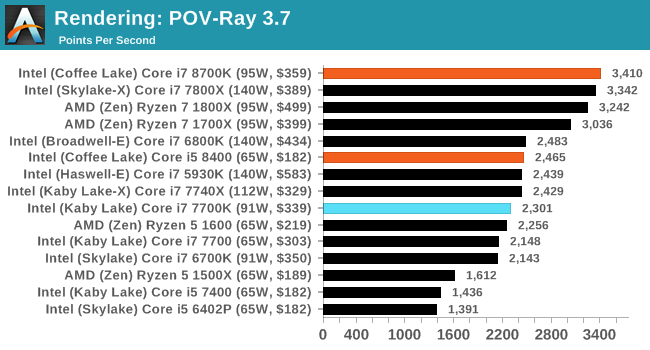
Cinebench R15: link
The latest version of CineBench has also become one of those 'used everywhere' benchmarks, particularly as an indicator of single thread performance. High IPC and high frequency gives performance in ST, whereas having good scaling and many cores is where the MT test wins out.
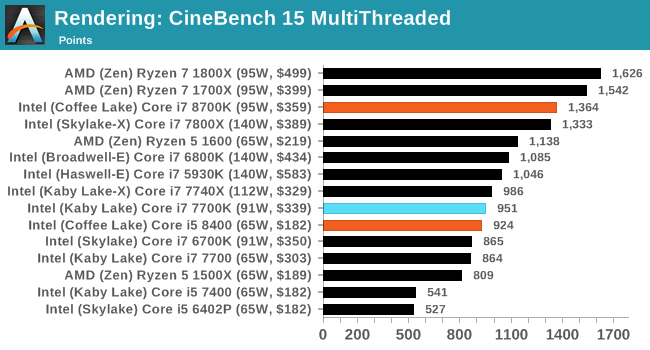
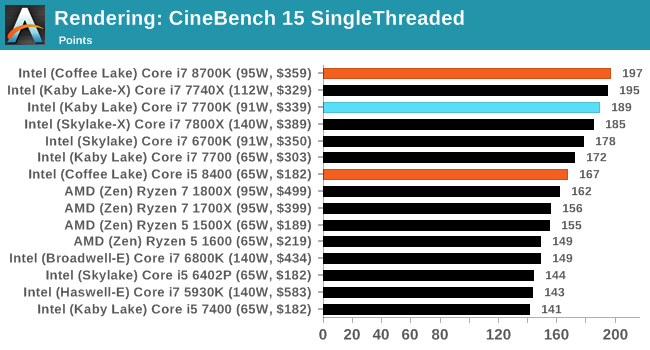
CineBench R15 in single thread mode can take the Core i7-8700K by the horns and drag it to be the best performing chip ever tested.










222 Comments
View All Comments
mapesdhs - Friday, October 6, 2017 - link
Any idea what that optimisation is? Seems odd that adding extra pure cores would harm performance, as opposed to adding HT which some games don't play nice with. Otherwise, are you saying that for this test, if it was present, the i3 8100 would come out on top? Blimey.Ian Cutress - Saturday, October 7, 2017 - link
They're either doing something to align certain CPU tasks for AVX, or it's bypassing code. You'd have to ask the developers on that.mapesdhs - Monday, October 9, 2017 - link
I doubt they'd explain what's happening, might be proprietory code or something.WickedMONK3Y - Thursday, October 5, 2017 - link
You have the spec of the i7 8700K slightly wrong. It has a base frequency of 3.7GHz not 3.8GHz.https://ark.intel.com/products/126684/Intel-Core-i...
Ian Cutress - Thursday, October 5, 2017 - link
Mistake on our part. I was using our previous news post as my source and that had a Typo. This review (and that news) should be updated now.Slomo4shO - Thursday, October 5, 2017 - link
Ian, this is probably your worst review to date. Lackluster choice of CPUs, mid-grade GPU, and lack of direct competition in the product stack... Why would you not use a GTX 1080 Ti or Titan XP?Ian Cutress - Thursday, October 5, 2017 - link
All the CPUs we've ever tested are in Bench. Plenty of other data in there: the goal was to not put 30+ CPUs into every graph.Our benchmark database includes over 40 CPUs tested on the GTX 1080, which is the most powerful GPU I could get a set of so I can do parallel testing across several systems. If that wasn't enough (a full test per CPU takes 5 hours per GPU), the minute I get better GPUs I would have to start retesting every CPU. At the exclusion of other content. Our benchmark suite was updated in early Q2, and we're sticking with that set of GPUs (GTX 1080/1060/R9 Fury/RX 480) for a good while for that reason.
Note I had three days to do this review.
crimson117 - Thursday, October 5, 2017 - link
Good job! More people need to know about the bench...Slomo4shO - Thursday, October 5, 2017 - link
To be fair the R5 1600 was added to the benches after the fact. In addition, your othwr reviews tend to be much more detailed and data driven with relevant products and multiple GPUs.Why would I read your review if you expect me to dig through your benchmark to obtain relivant data?
I can understand and appreciate the time crunch but it is a poor excuse for some of the decisions made in this review.
Take it with a grain of salt, this was not your best work.
mapesdhs - Friday, October 6, 2017 - link
Ooohhh the effort of examing the data in Bench! :D First world problems. Sheesh...Run your own tests then, see how you get on with having a life. It's insanely time consuming.